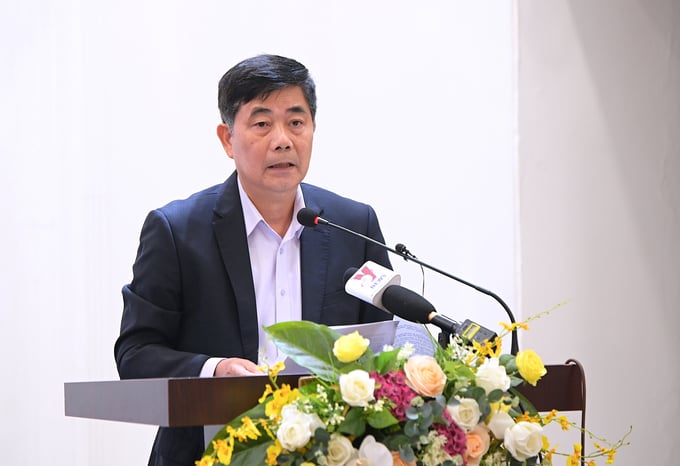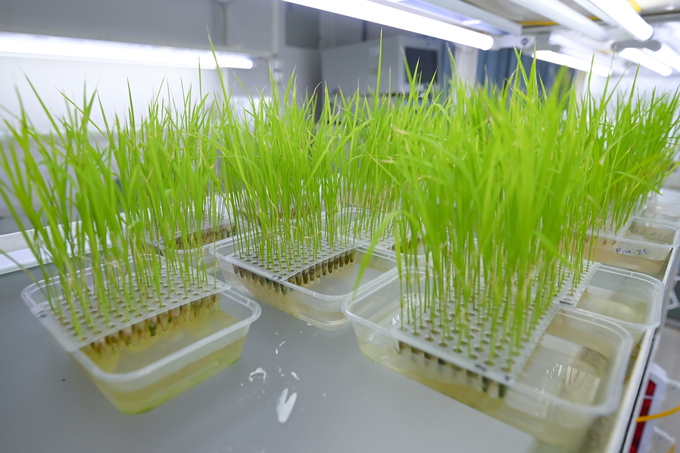June 19, 2025 | 01:24 GMT +7
June 19, 2025 | 01:24 GMT +7
Hotline: 0913.378.918
June 19, 2025 | 01:24 GMT +7
Hotline: 0913.378.918

Dr. Cao Duc Phat shared insights on advancements in biotechnology and its applications in agriculture. Photo: Tung Dinh.
Speaking on the morning of October 5 at the forum on “Achievements and directions for applying biotechnology to support sustainable agricultural development in the context of international integration,” Dr. Cao Duc Phat stated that biotechnology is a powerful scientific tool that has transformed the global agricultural sector in recent decades.
For instance, the former Minister of Agriculture and Rural Development noted that biological products are being widely used in crop production, livestock farming, and aquaculture as effective solutions for sustainable development.
In addition, tissue culture has become an industry in many countries, enabling the propagation of disease-free, high-quality plants, while genetic technology is being widely applied in breeding.
“To date, nearly 200 million hectares of genetically modified crops have been cultivated globally, accounting for 78% of the world’s soybean-growing area, 64% of cotton, 26% of corn, and 24% of canola,” Dr. Phat noted.
He emphasized that biotechnology has provided numerous benefits, particularly in significantly increasing the yields of crops such as corn, soybeans, and cotton, while also reducing the need for pesticides.
In Vietnam, Dr. Phat affirmed that the Party and Government have prioritized the research and application of biotechnology from early on.
Specifically, in 2005, the Secretariat issued Directive 50-CT/TW on May 4, promoting the development and application of biotechnology to support the country’s industrialization and modernization. In 2016, the Secretariat issued Conclusion 06, continuing the implementation of Directive 50.
Following that, the Government launched several programs and projects focused on developing and applying biotechnology in the agricultural sector. Notably, Prime Ministerial Decision No. 11/2006/QD-TTg, dated January 12, 2006, approved a Key Program on the development and application of biotechnology in agriculture and rural development until 2020. This was followed by Decision 97 in 2007, specifically aimed at the aquaculture sector.
In 2017, the Prime Minister issued Decision 553, which approved the master plan for biotechnology development up to 2030. In 2021, Decision 429/QD-TTg was issued, approving the project on developing the biological industry in the agricultural sector through 2030.
Most recently, on January 30, 2023, the Politburo issued Resolution No. 36-NQ/TW, which focused on developing and applying biotechnology to promote the country’s sustainable development in the current context.

Gene-editing technology has since enabled the development of numerous disease-resistant rice varieties. Photo: Tung Dinh.
Biotechnology is now being applied across various agricultural fields in Vietnam, including the use of biological products, diagnostic kits, and tissue culture techniques. Since 2014, genetically modified crops such as corn, soybeans, and cotton have been permitted for cultivation and use in Vietnam, following a lengthy process of rigorous testing to meet international standards.
Alongside these advancements, Vietnam's capacity for biotechnology development has grown in terms of human resources, equipment, and institutional infrastructure.
“The benefits of applying biotechnology in agriculture are undeniable, and so far, there is no evidence to support the fears of negative effects that some people have expressed,” affirmed Dr. Cao Duc Phat, Chairman of the Board of Directors at the International Rice Research Institute (IRRI).
However, Dr. Phat expressed concern that the development and application of biotechnology in Vietnam’s agricultural sector has been progressing too slowly. The gap between Vietnam and the world continues to widen, and the country has not met the goals set by the Party and Government. The main barrier, according to Dr. Phat, is a lack of awareness.
Globally, there are many emerging trends in the development and application of biotechnology, such as combining microbiology with nanotechnology to create highly effective biological products.
Other trends include the use of cellular technology to commercially produce meat and fish, and the increasing application of gene-editing technology, which is gradually replacing gene transfer techniques. Moreover, the integration of biotechnology with digital technologies and artificial intelligence (AI) is enhancing the efficiency of biotechnology research and development.
According to Dr. Cao Duc Phat, to avoid falling behind, Vietnam must quickly adopt, understand, and apply these new technological trends.
“Unlike 20 years ago, Vietnam now has a large team of well-trained scientists and technicians, and many laboratories are equipped with modern facilities. The key issue is to fully grasp and rigorously implement the policies set by the Party and Government, overcome any sense of inferiority, make adequate investments, and remove legal barriers to allow Vietnam’s biotechnology sector to advance alongside the world,” Dr. Cao Duc Phat analyzed.
At the forum, Dr. Cao Duc Phat also revisited some of the goals and visions for 2020 outlined in Decision 11/2006/QD-TTg. According to this plan, Vietnam’s agricultural biotechnology sector was projected to reach the level of the leading countries in ASEAN and, in some areas, to achieve a world-class standard.
For example, more than 70% of the area used for growing new plant varieties would be developed using biotechnology techniques, with 30-50% of that area dedicated to genetically modified varieties. Over 70% of the demand for disease-free plant varieties would be met through micropropagation techniques, and more than 80% of the area used for vegetables and fruit trees would rely on biological fertilizers and pesticides. Additionally, the country would largely meet its demand for vaccines for livestock.
In conclusion, agricultural biotechnology was expected to contribute over 50% of the total scientific and technological input driving the increase in value within the agricultural sector.
Translated by Quynh Chi
![Turning wind and rain into action: [9] Digitizing hydrometeorological data in response to climate change](https://t.ex-cdn.com/nongnghiepmoitruong.vn/608w/files/news/2025/06/17/z6704423696987_15fd32ffc26d590d204d520c9dac6786-nongnghiep-165943.jpg)
(VAN) Farmers have begun accessing hydrometeorological applications to adjust their cropping schedules, aiming to ensure productivity and adapt to climate change.
![Turning wind and rain into action: [8] Real-time salinity detection and early warning technology](https://t.ex-cdn.com/nongnghiepmoitruong.vn/608w/files/news/2025/06/17/z6704423696987_15fd32ffc26d590d204d520c9dac6786-nongnghiep-151127.jpg)
(VAN) Thanks to the integration of modern hydrological-hydraulic models, remote sensing technologies, and artificial intelligence, the accuracy of hydrological forecasting has significantly improved.
![Turning wind and rain into action: [7] Early disaster warnings help marine farmers minimize losses](https://t.ex-cdn.com/nongnghiepmoitruong.vn/608w/files/news/2025/06/17/z6704423696987_15fd32ffc26d590d204d520c9dac6786-nongnghiep-142942.jpg)
(VAN) In recent years, thanks to early disaster warnings and forecasting, marine farmers in Khanh Hoa province have been able to reduce risks and losses, thereby improving production efficiency.
![Turning wind and rain into action: [6] ‘Four on-the-spot’ disaster management software](https://t.ex-cdn.com/nongnghiepmoitruong.vn/608w/files/news/2025/06/17/e5a48259d6a262fc3bb3-nongnghiep-183800.jpg)
(VAN) By simply activating the scenario on the disaster management software, the relevant authorities immediately know how many households need to be evacuated, where to evacuate them to, and by what means of transportation…
![Turning wind and rain into action: [5] Hue applies modern technology in disaster forecasting](https://t.ex-cdn.com/nongnghiepmoitruong.vn/608w/files/news/2025/06/17/z6704423696987_15fd32ffc26d590d204d520c9dac6786-nongnghiep-093938.jpg)
(VAN) In Hue city, modern technology has recently been applied in meteorological and hydrological forecasting and warning, helping to reduce the damage caused by natural disasters.

(VAN) A cutting-edge farming technique being implemented on an experimental ranch in Arizona's Sonoran Desert has already saved a billion gallons of water over five years, according to Civil Eats.

(VAN) Poultry and pig production and the environment can be boosted through enhanced water technology, according to new research.